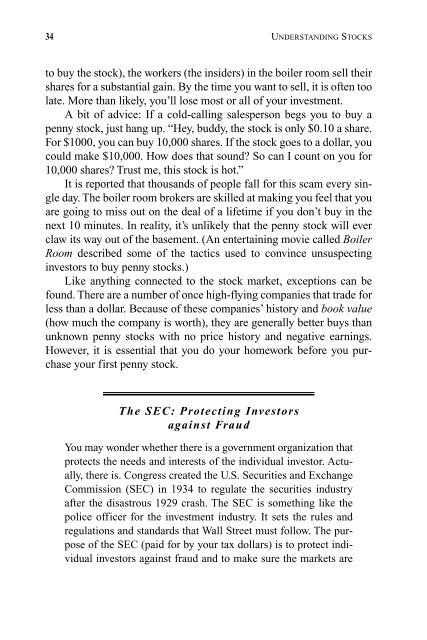Understanding Stocks
Understanding Stocks
Understanding Stocks
You also want an ePaper? Increase the reach of your titles
YUMPU automatically turns print PDFs into web optimized ePapers that Google loves.
34 UNDERSTANDING STOCKS<br />
to buy the stock), the workers (the insiders) in the boiler room sell their<br />
shares for a substantial gain. By the time you want to sell, it is often too<br />
late. More than likely, you’ll lose most or all of your investment.<br />
A bit of advice: If a cold-calling salesperson begs you to buy a<br />
penny stock, just hang up. “Hey, buddy, the stock is only $0.10 a share.<br />
For $1000, you can buy 10,000 shares. If the stock goes to a dollar, you<br />
could make $10,000. How does that sound? So can I count on you for<br />
10,000 shares? Trust me, this stock is hot.”<br />
It is reported that thousands of people fall for this scam every single<br />
day. The boiler room brokers are skilled at making you feel that you<br />
are going to miss out on the deal of a lifetime if you don’t buy in the<br />
next 10 minutes. In reality, it’s unlikely that the penny stock will ever<br />
claw its way out of the basement. (An entertaining movie called Boiler<br />
Room described some of the tactics used to convince unsuspecting<br />
investors to buy penny stocks.)<br />
Like anything connected to the stock market, exceptions can be<br />
found. There are a number of once high-flying companies that trade for<br />
less than a dollar. Because of these companies’ history and book value<br />
(how much the company is worth), they are generally better buys than<br />
unknown penny stocks with no price history and negative earnings.<br />
However, it is essential that you do your homework before you purchase<br />
your first penny stock.<br />
The SEC: Protecting Investors<br />
against Fraud<br />
You may wonder whether there is a government organization that<br />
protects the needs and interests of the individual investor. Actually,<br />
there is. Congress created the U.S. Securities and Exchange<br />
Commission (SEC) in 1934 to regulate the securities industry<br />
after the disastrous 1929 crash. The SEC is something like the<br />
police officer for the investment industry. It sets the rules and<br />
regulations and standards that Wall Street must follow. The purpose<br />
of the SEC (paid for by your tax dollars) is to protect individual<br />
investors against fraud and to make sure the markets are

















